We're happy to present this article by Kelly Schryver from one of our favorite sites, Common Sense Media [1].
You probably never thought you'd see the day when Facebook wasn't the center of teens' universe [2]. But keeping up with Facebook friends through ad-filled news feeds and lengthy profiles, especially given the fact that everyone knows your name, is starting to feel tiresome to many teens.
Facebook is still a go-to place for many things [3], such as wishing someone a happy birthday or stalking a crush. However, newer social apps make it easier, faster, and more fun to capture and share fleeting moments — sometimes anonymously. These temporary and anonymous-messaging apps provide an environment that feels more appropriate to the random, silly, saucy, and experimental sides of the average teenager.
Perhaps most importantly to teens, these apps can feel consequence-free [4]. But of course they're not. Data never really disappears, and anonymity carries big risks. If you don't recognize the apps your kid is currently obsessing over, here's what you need to know.
Temporary Apps

Temporary apps allow people to send messages and images that self-destruct after a set window of time. Teens can use these apps to more carefully manage their digital trails — so long as they don't share things they wouldn't normally send otherwise.
Snapchat
A messaging app that lets users put a time limit on the pictures and videos they send before they disappear.
Why it's popular: Snapchat's [5] creators intended the app's fleeting images to be a way for teens to share fun, light moments without the risk of having them go public. And that's what most teens use it for: sending goofy or embarrassing photos to one another. Teens may pay more attention to Snapchats, knowing they'll disappear in a matter of seconds.
What parents need to know:
- It's not true that Snapchats go away forever. Data is data: whenever anything is sent online, it never truly goes away. (For example, the person on the receiving end can easily take a screenshot of the image before it disappears.) Snapchats can even be recovered — unaffiliated third-party services such as Snapsaved (which was recently hacked [6]) give users the chance to save any Snapchatted pic.
- It can make sexting seem OK. [7] The seemingly risk-free messaging might encourage users to share pictures containing inappropriate content.
Burn Note
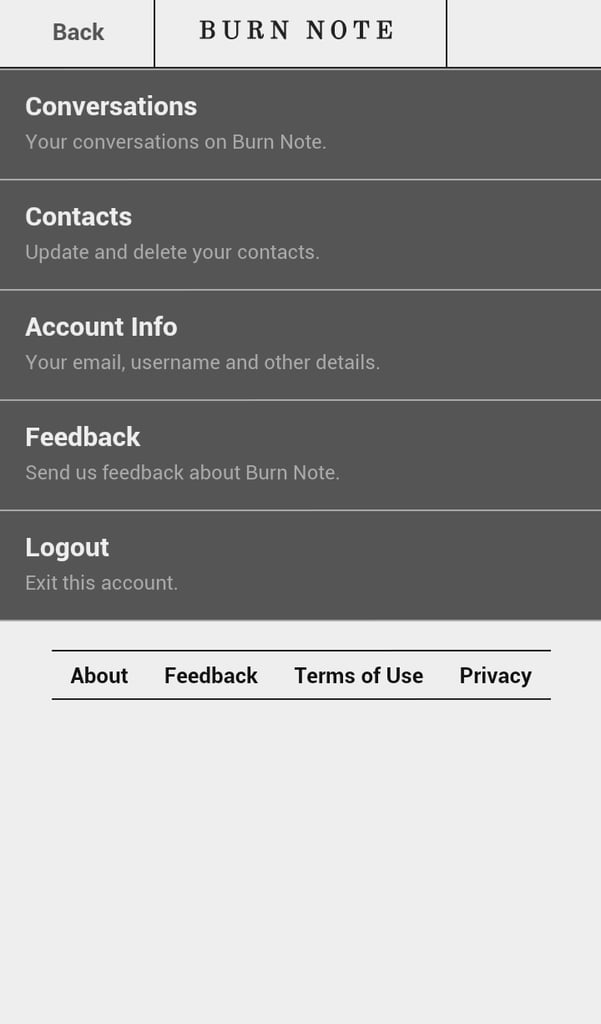
A messaging app that erases messages after a set period of time. It's limited to text; users can't send pictures or video.
Why it's popular: Its text-only platform, plus its unique display system that reveals only one word at a time, make it feel more secretive than similar apps.
What parents need to know:
- It promises complete delete. Kids may feel tempted to reveal more than they would otherwise, since Burn Note's [8] developers claim it deletes every copy of the message (except from screenshots, which they also try to prevent).
- Anyone can receive a Burn Note. If you don't have the app, you'll get a link to a Burn Note message. So even if your kid has no interest in reading supposedly supersecret messages, she could unwittingly get involved.
- It could encourage cyberbullying. Since there is no record that a conversation took place, kids might feel they can get away with disrespectful behavior.
Slingshot
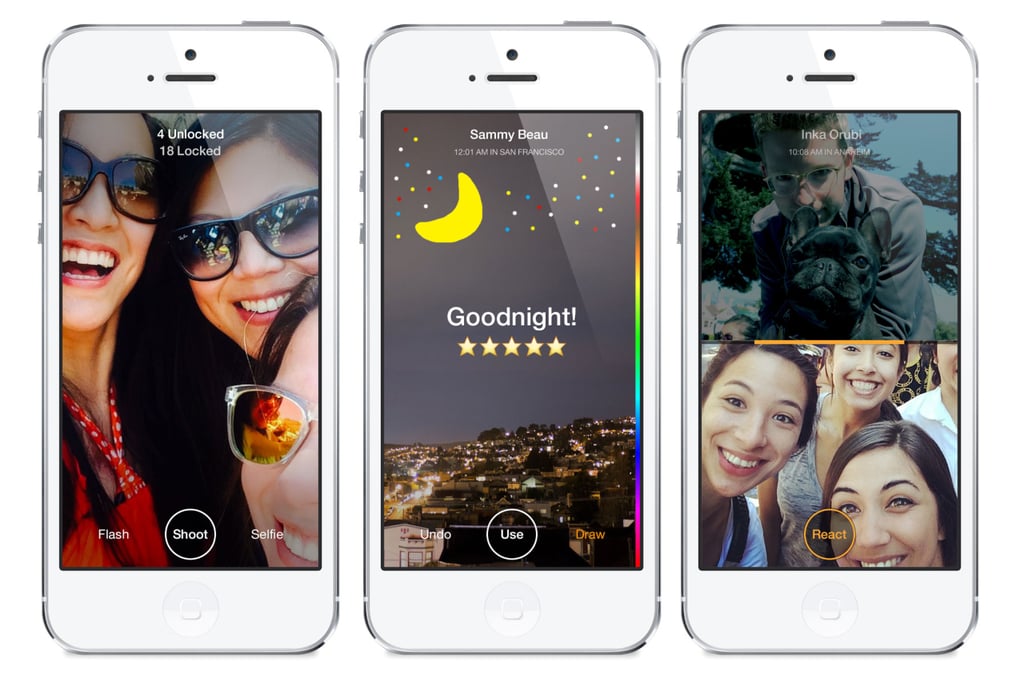
Facebook's answer to Snapchat. The twist is that before you can view a photo or video you've received, you'll have to send the sender a shot of your own. After you've viewed it, the shot disappears.
Why it's popular: The video or photo options paired with the ability to type or draw on the shots create an easy way to share brief moments and fun, creative messages.
What parents need to know:
- Although the app comes from Facebook, you're not required to have a Facebook account to use it; you can send and receive shots with people who aren't your Facebook friends.
- Anyone who knows your teen's phone number or Slingshot [9] username can send photos and videos to your teen. Users register for the app with their Facebook account or a mobile phone number, and the app will search your contacts for friends who have the app.
- Unless you decline use of location services, your city, date, and time will appear each time you send anything from Slingshot.
LINE
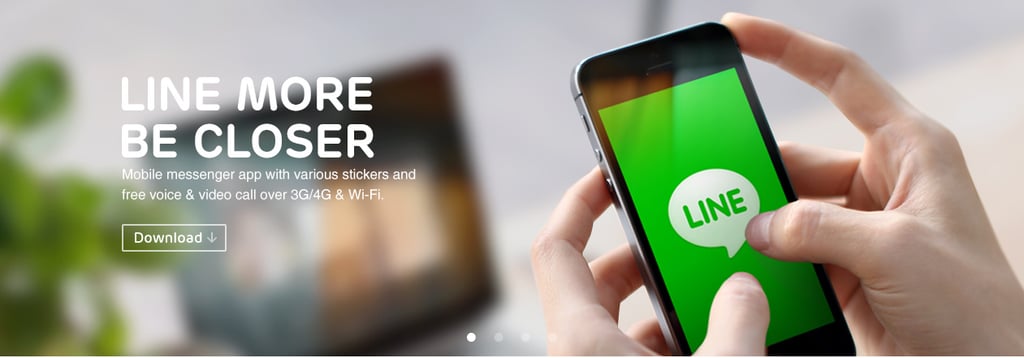
A multifaceted text, video, and voice-messaging app that also integrates social media elements such as games and group chats.
Why it's popular: Teens are drawn to LINE [10] not only because it's a bit of an all-in-one mobile hub but also because it offers a lot of of teen-friendly elements, such as a selection of over 10,000 stickers and wacky emoticons, as well as LINE Play, an avatar-based social network. The free texting and video calls don't hurt, either.
What parents need to know:
- LINE includes a feature called "Hidden Chat," which is similar to Snapchat's disappearing messages but with a few more options. Users can choose how long they'd like their message to last before it vanishes: two seconds or up to a week. These messages also can include location information, pics, and video. Though LINE states that its servers are secure, as with Snapchat you can't be too careful.
- In-app purchases are a big part of the LINE experience: Want to use that set of super-cute cat emojis? It'll cost you. Paying for games and other features within LINE can add up, and to keep communication free, the recipient also must be a LINE user, meaning your friends have to sign up as well.
- LINE's terms of use state that "minors" need parental permission before signing up, but there's no process in place to monitor or track that information.
Anonymous Apps
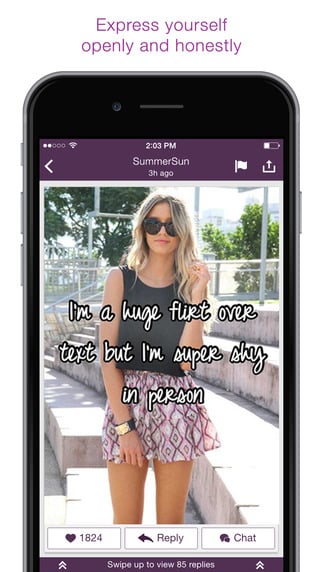
On the positive side, going incognito online helps us express ourselves in ways we might not be able to in the real world. On the negative side, anonymous apps are often riddled with inappropriate content. They also can encourage bullying behavior.
Whisper
A social "confessional" app that allows users to post whatever's on their minds. Users type a confession, add a background image, and share it with the Whisper [11] community. It’s intended for users age 17 and older.
Why it's popular: There’s something to be said about sharing one's innermost thoughts without any repercussions, especially if they're not socially acceptable: It's cathartic. For those who simply choose to browse, Whisper can be amusing, heartbreaking, troubling, and comforting all at once.
What parents need to know:
- The scenarios can be hard to stomach. Reading that a teacher has fantasies about his or her students or that someone’s father is going to be released from jail and start a custody battle can weigh heavily on teens. Some confessions, however, are totally benign (and funny!).
- There is plenty of inappropriate content. All too often, Whispers are sexual. Some use Whisper to solicit others for sex (using the app's geo-location "nearby" feature). Strong language and drug and alcohol references also are prevalent (for example, "My wife and I were both high on our wedding day" and "I dropped acid with my mom once").
- Whispers can go public. Entertainment news sites, such as BuzzFeed [12], are beginning to feature Whispers. The problem? When secrets -- including the embellished or fake ones — become news, we may begin to find ourselves in tabloid territory.
Ask.fm
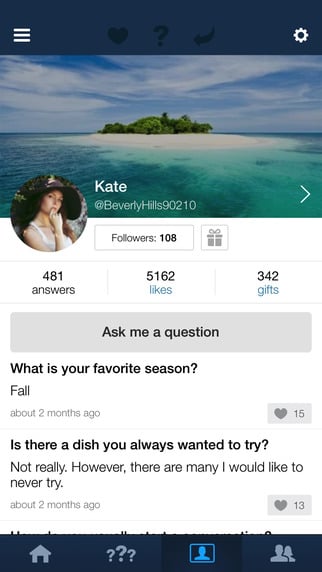
A social site that lets kids ask questions and answer those posted by other users — sometimes anonymously.
Why it's popular: Although there are some friendly interactions on Ask.fm [13] — Q&As about favorite foods or crushes, for example — there are lots of mean comments and some creepy sexual posts. This iffy content is part of the site's appeal for teens.
What parents need to know:
- Bullying is a major concern. The British news website MailOnline reported that the site has been linked to the suicides of several teens. Talk to your teens about cyberbullying [14] and how anonymity can encourage mean behavior.
- Anonymous answers are optional. Users can decide whether to allow anonymous posts and can remove their answers from streaming to decrease their profile's visibility. If teens do use the site, they'd be best turning off anonymous answers and keeping themselves out of the live stream.
- Q&As can appear on Facebook. Syncing with Facebook means that a much wider audience can see those Q&As' behavior.
Omegle
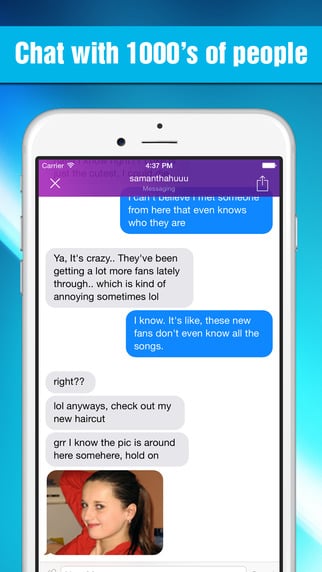
An anonymous chat client through which users discuss anything they'd like. Its conversations are filled with lewd language and references to sexual content, drugs and alcohol, and violence.
Why it's popular: Online chat rooms have been around for ages, as have the iffy and inappropriate conversations that happen in them. Though there are many misconceptions about "online predators," it’s true that risky online relationships — though rare — more frequently evolve in chat rooms when teens willingly seek out or engage in sexual conversation [15].
What parents need to know:
- Users get paired up with strangers. That's the whole premise of the app. The app has been implicated in cases of sexual predators [16] on teens. And there's no registration required.
- This is not an app for kids and teens. Omegle [17] is filled with people searching for sexual chat. Some prefer to do so live. Others offer links to porn websites.
- Language is a big issue. And since the chats are anonymous, they're often much more explicit than those with someone who can be identified.
Cloaq
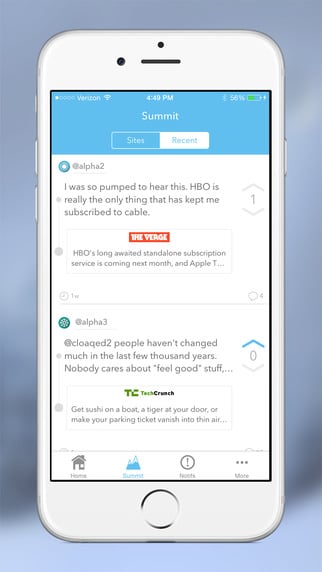
An anonymous posting site [18] that doesn't collect any personal information and assigns random usernames. Users can post text and pictures and comment on content from sites such as Buzzfeed and Mashable [19].
Why it's popular: Cloaq is gaining traction because its community is relatively supportive of its own members. Some users claim that they "hold themselves to a higher standard."
What parents need to know:
- As with any anonymous posting site or app, there are risks: People behave differently when their identities are protected, and they may be emboldened to say things they wouldn't otherwise.
- Posts are sometimes personal, sometimes philosophical, and sometimes just chatty, but language is the most frequent iffy content in the main feed.
- Despite the developer's claims that no information is collected or kept, there are no guarantees, so it's critical that kids understand that nothing written online or in an app is ever really anonymous, as it's always linked to the device they're using.